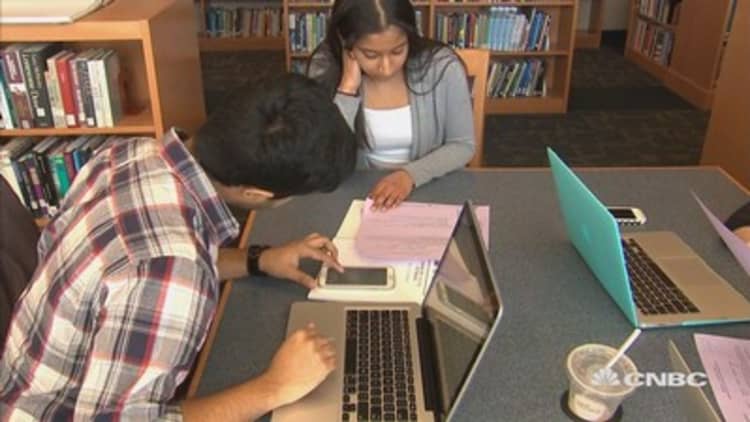
With the cost of attending a four-year public university crossing $34,000 a year for out-of-state students, more people are turning to online education as a cheaper and more flexible alternative to brick-and-mortar schools.
In fact, the number of students enrolling in online private not-for-profit institutions jumped over 11 percent in the last year, according to the Online Learning Consortium.
Earning an online degree does come with its own set of unique challenges, however, and not all internet programs offer the same level of student services, such as financial aid counseling or academic support. Also, the cost per credit varies depending on the school.
On average, though, going the online route is often cheaper, especially if you're attending a public university that's not in your home state. A recent analysis of a public Florida college showed a student would save over $20,000 earning their degree online at the same school.
Students going to online colleges generally are eligible for the same federal financial aid as their brick-and-mortar counterparts as long as the school is accredited and has signed an agreement with the Department of Education designating it a Title IV school.
For many students, online schools give them an opportunity to finish something they started years before.
Take the case of Jonathan Paul.
"When I went to college the first time, I really didn't have direction, it was just the next step and I wasn't really motivated to complete my degree," said the now 32-year-old Pennsylvania resident.
That lack of motivation ultimately lead Paul to drop out as a junior and spend the next nine years in self-described limbo, working long hours at various jobs but never feeling like he was making progress.
Today he's a college graduate after earning his bachelor's of finance at Penn State World Campus, the top-ranked online branch of Pennsylvania's state school.
Adult learners make up the majority of students at Penn State World Campus, where roughly 80 percent are over age 24. Many are married and financially independent and may have served in the armed forces as well.
"They are very attracted to online learning as being a very flexible, student centered, adult-friendly way to pursue their degrees," said Karen Pollack, assistant vice provost for online undergraduate programs at the university.
Yet the world of online higher education carries a lingering stigma after several for-profit institutions became the target of federal probes, accused of deceptive marketing practices and misleading students about job placement rates.
As a result, it is important for prospective students to ascertain that the program is accredited. It's also a good idea to read reviews from current students.
"There's a lot of great opportunities to research online," said Amy Glaser, senior vice president at Adecco Staffing. "Most important, I would ask the online program itself if they can provide some references to you."
Many schools are working hard to distance themselves from the negative publicity.
"We're proud of the fact that the diploma looks exactly the same as the diploma a residential student would receive," said Pollack.
"Our students tell us that they come away learning more, ... that it's more difficult and they had to engage more deeply with the material," she said.
Within the academic community. online courses are becoming more accepted, with 71 percent of leaders rating learning outcomes in online education as the same or superior to face-to-face instruction.
More important, employers are coming around as well.
A recent survey of middle managers found 47 percent said they would be "extremely" or "very likely" to hire someone with an online degree, according to a survey conducted by Rasmussen.
"Employers today are absolutely placing an online degree on the same playing field with a more traditional university," said Glaser. "However with anything on your resume you need to be prepared to speak to the benefits of your online degree."
Regardless of how his classes were structured, Paul plans on making this second chance count.
"To have discovered this and have this second opportunity, it's been something that I'm sure I am not going to let slide."







